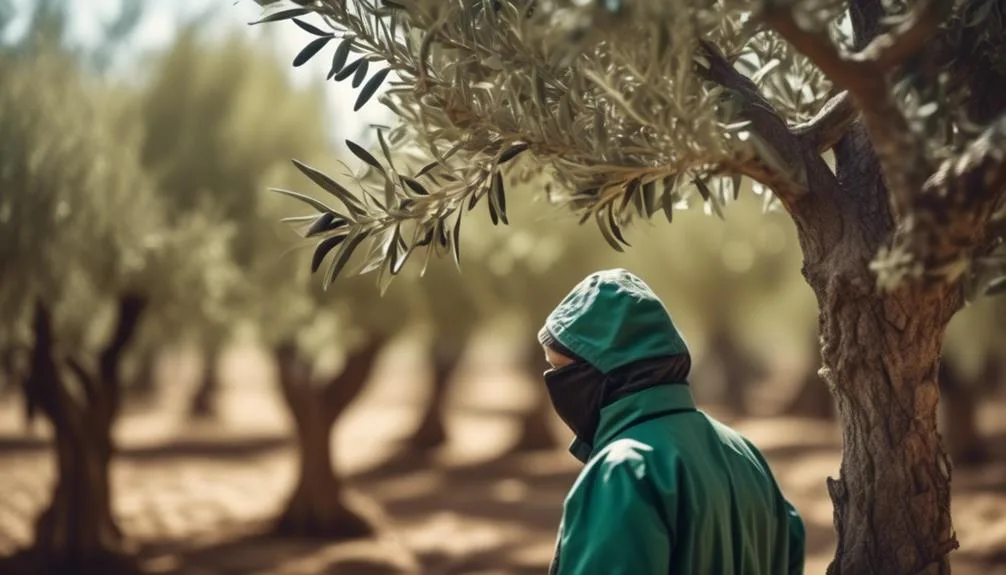Caring for olive trees can be challenging when dealing with diseases. Just like taking care of our own health, keeping olive trees healthy involves a well-rounded approach.
From spotting common diseases to using natural methods and organic treatments, there are many ways to protect your olive trees.
In this discussion, we'll look at how to manage olive tree diseases naturally, giving you the knowledge to keep your orchard thriving.
Key Takeaways
- Early detection and integrated pest management techniques are crucial for effectively managing olive tree diseases organically.
- Natural methods such as proper spacing, adequate sunlight, soil drainage, and good air circulation contribute to preventing olive tree diseases.
- Organic treatments including organic sprays, compost tea, encouraging natural predators, and using insecticidal soaps or horticultural oils can help control olive tree diseases.
- Cultural practices such as cultivating healthy soil, proper irrigation and drainage, adding organic matter like compost, and regular pruning support the overall health of olive trees and reduce the risk of diseases.
Identifying Common Olive Tree Diseases
If you notice wilting leaves, dark spots, or unusual growths on your olive tree, it may be showing signs of common diseases that need to be identified and managed promptly.
Early detection is crucial for effective prevention and management. Integrated pest management techniques can help diagnose and address these issues organically.
By closely monitoring your olive tree for any signs of disease, you can take proactive measures to prevent the spread of infections. Regularly inspect the leaves, branches, and trunk for any abnormalities, and promptly address any issues that arise.
Understanding the common diseases that affect olive trees, such as anthracnose or olive knot, is vital for proper diagnosis. By staying vigilant and implementing organic management strategies, you can effectively combat these diseases and ensure the health of your olive tree.
Natural Methods for Preventing Olive Tree Diseases
To prevent olive tree diseases naturally, implement cultural practices such as proper spacing, adequate sunlight, and soil drainage to promote tree health and resistance to infections.
These preventative measures are holistic approaches that can significantly reduce the risk of disease.
Proper spacing between olive trees allows for good air circulation, which helps prevent the spread of fungal diseases.
Ensuring that the trees receive adequate sunlight promotes strong, healthy growth and helps to naturally combat pests and diseases.
Additionally, maintaining well-draining soil reduces the risk of root rot and other moisture-related issues.
Organic Treatments for Olive Tree Diseases
You can effectively manage olive tree diseases using organic treatments that prioritize the health of the tree and the surrounding environment.
Here are some organic treatments to consider:
- Organic Sprays: Utilize organic sprays such as neem oil, garlic oil, or copper-based fungicides to control fungal diseases and pests without harming beneficial insects.
- Fungal Control: Apply compost tea or aerated compost tea to boost the tree's natural defenses against fungal infections and improve overall soil health.
- Pest Management: Encourage natural predators like ladybugs and lacewings, and use insecticidal soaps or horticultural oils to manage harmful pests while preserving the balance of the ecosystem.
Cultural Practices to Support Olive Tree Health
Cultivating healthy soil and providing proper irrigation are essential cultural practices for supporting the health of your olive trees. When it comes to soil maintenance, ensuring good drainage and adding organic matter like compost can help promote a healthy root system. Additionally, practicing proper pruning techniques can aid in maintaining the overall health and productivity of your olive trees. Regular pruning helps remove diseased or damaged branches, improves airflow, and encourages the development of strong, fruit-bearing branches. Below is a table outlining some key cultural practices for supporting olive tree health:
| Cultural Practices | Description |
|---|---|
| Soil Maintenance | Ensure good drainage and add organic matter like compost |
| Pruning Techniques | Regular pruning to remove diseased or damaged branches |
Creating a Disease-Resistant Environment for Olive Trees
How can you create a disease-resistant environment for your olive trees while maximizing productivity and health? By implementing the following practices:
- Soil management: Regularly amend and improve the soil to maintain its fertility and structure, providing a strong foundation for healthy olive tree growth.
- Pest control: Utilize natural pest control methods such as beneficial insect habitats, companion planting, and pheromone traps to reduce pest populations and minimize the risk of disease transmission.
- Proper irrigation: Implement efficient irrigation practices to ensure that olive trees receive adequate moisture without creating conditions favorable for disease development.
Conclusion
Incorporating organic management techniques for olive tree diseases not only ensures the health of your trees but also promotes a sustainable and eco-friendly environment.
By identifying, preventing, and treating diseases naturally, you can nurture disease-resistant olive trees and enjoy a plentiful harvest.
Embracing these organic practices not only benefits your orchard but also contributes to a healthier ecosystem.
How will you implement these methods to cultivate thriving olive trees while preserving the environment?

